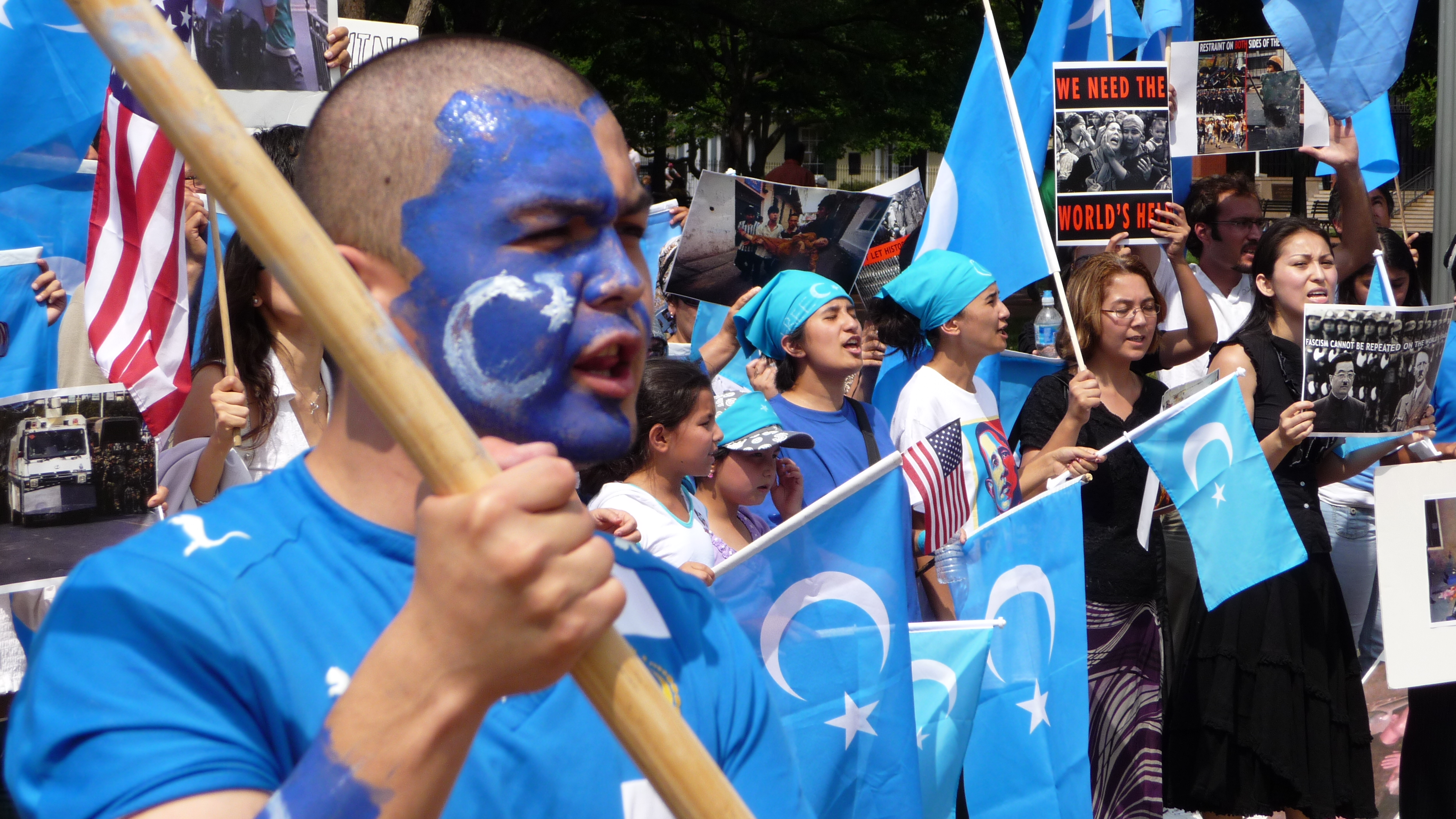 |
Protest against the PRC/CCP/ PLA massacre of Uighurs in Xinjiang "Autonomous" Region, 2009. |
Human Rights
The State Department's 2010 Human Rights Practices and International Religious Freedom Reports noted China's continuing abuses of human rights in violation of internationally recognized norms, stemming both from the authorities' intolerance of dissent and the inadequacy of legal safeguards for basic freedoms. The government has increased its efforts to reign in civil society, particularly non-governmental organizations (NGOs) involved in rights advocacy and public interest issues, and has stepped up attempts to limit freedom of speech and freedom of religion and to control the press, the Internet, and Internet access. Abuses increased around high-profile events in 2010, such as the awarding of the Nobel Peace Prize to democracy activist Liu Xiaobo and the anniversaries of the 1959 Tibetan uprising, the Tiananmen Square incident, and the founding of the People’s Republic of China. The government continued its severe cultural and religious repression of ethnic minorities in the Xinjiang Uighur Autonomous Region (XUAR) and Tibetan areas. Other reported abuses included arbitrary and lengthy incommunicado detention, extrajudicial killings, executions without due process, forced confessions, torture, and mistreatment of prisoners as well as severe restrictions on freedom of speech, the press, assembly, association, religion, privacy, worker rights, and coercive birth limitation. China continues the monitoring, harassment, intimidation, and arrest of journalists, Internet writers, defense lawyers, religious activists, and political dissidents. The activities of NGOs, especially those relating to the rule of law and public interest work, continue to be restricted. The Chinese Government also seeks to regulate religious groups and worship. Religious believers who seek to practice their faith outside of state-controlled religious venues and unregistered religious groups and spiritual movements are subject to intimidation, harassment, and detention. Chinese Communist Party members are discouraged from participating in religious activities.
Since 1999, the Secretary of State has designated China a "Country of Particular Concern" under the International Religious Freedom Act for particularly severe violations of religious freedom.
 |
| Flag of the Uighurs |
China's economic growth and reform since 1978 have improved economic conditions for hundreds of millions of Chinese, increased social mobility, and expanded the scope of personal freedom. This has meant greater freedom of travel, employment opportunities, educational and cultural pursuits, job and housing choices, and access to information. In April 2009 the government unveiled its first National Human Rights Action Plan. The document outlined human rights goals to be achieved in 2009 to 2010 and addressed issues such as prisoners' rights and the role of religion in society.
The U.S. has conducted 14 rounds of human rights dialogue with China since the Tiananmen massacre. The most recent round took place in April 2011, led by Assistant Secretary for Democracy, Human Rights and Labor Michael Posner and Chinese Ministry of Foreign Affairs Director General for International Organizations Chen Xu. Discussion topics included, but were not limited to, freedom of expression, rule of law, religious freedom, labor rights, minority issues, and multilateral cooperation.
 On July 5, 2009, ethnic violence erupted in Urumqi and other parts of the Xinjiang Uighur Autonomous Region. The unrest continued in the following days, with Chinese state media reporting over 150 deaths and more than 1,000 injured. There was a significantly increased security presence in Urumqi and its surrounding areas and subsequently some mosques in Xinjiang were closed. Urumqi remains under a heavy police presence, and most Internet and international phone communication was cut off through early 2010.
On July 5, 2009, ethnic violence erupted in Urumqi and other parts of the Xinjiang Uighur Autonomous Region. The unrest continued in the following days, with Chinese state media reporting over 150 deaths and more than 1,000 injured. There was a significantly increased security presence in Urumqi and its surrounding areas and subsequently some mosques in Xinjiang were closed. Urumqi remains under a heavy police presence, and most Internet and international phone communication was cut off through early 2010. On October 8, 2010 the independent Norwegian Nobel Committee awarded Chinese human rights activist Liu Xiaobo the Nobel Peace Prize "for his long and non-violent struggle for fundamental human rights in China." He was the first Chinese citizen awarded a Nobel Prize of any kind while residing in China. Liu Xiaobo was arrested in China in December 2008 and convicted of “incitement to subvert state power” in December 2009. He remains in prison. Since the announcement of the award of the 2010 Nobel Peace Prize, there have been consistent reports that his wife, Liu Xia, has been under de facto house arrest, with her movements and communication controlled by the authorities. The United States has repeatedly called for the immediate release of Liu Xiabo, as well as other political prisoners in China, including those under house arrest, such as Liu Xia, and those enduring forced disappearances, such as Gao Zhisheng.
In late 2010 and early 2011, dozens of people, including public interest lawyers, writers, artists, intellectuals, and activists were arbitrarily detained and arrested. Among them was the prominent artist Ai Weiwei, whose detention in early April 2011 signaled an expansion of the Chinese Government’s crackdown on the activist community. While Ai Weiwei was released on bail in late June, the trend of forced disappearances, arbitrary detentions and arrests, and convictions of dissidents and activists in China for exercising their internationally recognized human rights continues.
Protest images are the property of Malcolm Brown and are used via Creative Commons Attribution-Share Alike 2.0 Generic license. Uighur flag is in the public domain. All images were obtained from Wikimedia Commons.

No comments:
Post a Comment